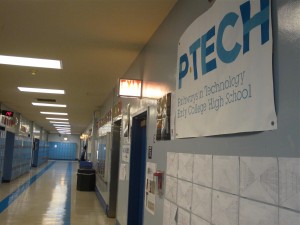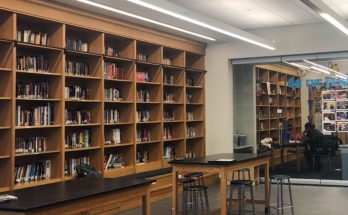
Paul Robeson High School is a four-story building in Crown Heights, Brooklyn. The building seems uninviting at first, with dull fluorescent lighting and a metal detector in the entryway. But take the elevator up to the third floor and you’ve arrived at Pathways in Technology Early College High School, also known as P-Tech.
Now in its second year, P-Tech was conceived as an innovative six-year program, believed to be the first school in the nation to incorporate high school and college, along with hands-on work connections with IBM. The idea was that students would get the benefit of an advanced curriculum by the time they graduated and come out better prepared than most for the next phase of their education.
But administrators at P-Tech quickly realized that while some of the students passing through the blue and grey-tiled halls were ready for those rigorous classes, many others were not.
Not long after the school opened, officials found that the majority of students could not meet the requirements for taking the college level courses: excelling on their Regents exams, a set of standardized tests given three times a year. So far, only 74 out of the 227 students have scored high enough, leaving 153 current students with sub-par scores.
Educators at P-Tech have begun to zero in on the space between what the school represents and their students’ current capacity to take advantage of it. P-Tech is now offering two different methods to eradicate any chance of lower test scores in the future with increased test prep and a new student mentor program.
Principal Rashid Davis says students need a grade of 75 or higher on their English exams and an 80 or higher on mathematics. The normal standard to graduate at city high schools is 65 on both. Students do not go through academic screening before entering P-Tech, which means that there’s a wide range of abilities.
“Because of the 9-14 model, students would have all four years of high school to reach the benchmark of 80 or 75,” says assistant principal Junghyun Kym. “The model is providing different pathways for individuals who may be able to reach those benchmarks at a quicker pace.”
True to its name, P-Tech provides two different degrees that are both affiliated with the technology field: computer systems and electro-mechanical engineering technology (EMT).
Kym says that in order to graduate with a degree, students need 60 credits for computer systems and 64 credits for EMT.
While the pressure to get on the college track is apparent for freshmen and sophomores, junior year is when the workload will really begin to shift. According to Davis, students are expected to take classes on the City Tech campus—a CUNY school— in the spring of their third year, besides the courses at P-Tech, although a handful of freshmen and sophomores have started taking them already.
This year, the school administration decided to up their game in an effort to remedy this disparity.
In the school’s shining hallways, flyers for P-Tech’s mentorship program are taped to each blue classroom door. The school-organized mentor program begins this month and will last until August of this year, to give other P-Tech students a much-needed boost. Davis explains that the program itself is meant to create positive relationships between students to give others the encouragement they need to move up.
But the mentorship project has not yet gathered the hoped-for momentum. When asked, many students, like sophomore Michelle Nguyen, had heard of the program but said they were not participating.
Nguyen is one of the students who managed to get an early start on college classes. She is taking college calculus on the City Tech campus—the only student in the entire school doing this so far.
Nguyen, along with two other P-Tech students, excelled in her Regents and also passed a placement test for CUNY, which she took in October. She’s also currently taking college courses at the high school as well.
Before the mentorship program began, P-Tech staff members used online tools and mock Regents to prepare students for the exams in January, June and August. They also provide a Saturday academy two months before the exams, and summer classes to give kids extra preparation.
While Nguyen doesn’t feel much of a difference between her high school and college level classes, she admits that taking courses on a college campus is completely different.
“It feels very different from here,” she said. “It’s more unfamiliar and more of a feeling to take more responsibility.
Emma Myer’s speech class is one of several college level courses P-Tech students need for their degree. Myers, a young and petite adjunct professor from CUNY Brooklyn College teaches at the high school twice a week, showing students the ins and outs of public speaking. She explains that her class is only slightly more rigorous than a high school level course would be. For current P-Tech freshmen and sophomores, perhaps getting into these classes may sometimes prove more challenging than the classes themselves.
“I have to keep in mind that these are high school kids so some of these concepts are new to them,” Myers says. “For a college level course, more is expected of you, so they need to take more responsibility for assignments.”
This specific class has 10 students, about half of the amount of some of the high school classes at P-Tech. Since many of the seats in Myers’s room aren’t filled, students cluster together in the first three rows of the class. The hope is that this time next year, classes like this will double in size.
While 16-year-old Bryan Rosario notices the difference in rigor between the high school and college courses, at the end of the day he still finds all of the work doable.
“You have to get a 75 or higher on the English Regents, and once you have that and you have the credits for the English Language Arts class, you can take this class,” he says. “It gets a little difficult with the projects and everything, but other than that it feels like another regular class.”
Kym explains that Davis is a principal who is familiar with strong preparation for Regents testing, and believes in testing early and often.
“Everything is a work in progress,” Kym says. “We are a data driven school so how we support students depends on the analysis of data.”
In order for P-Tech to live up to its name, Davis and his administration has no option but to mend this situation early on with as much test prep as possible— it’s about all they can do in an attempt to place students on a somewhat level footing. Regents testing will resume again this June, and again at the end of the summer.



